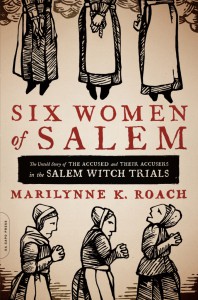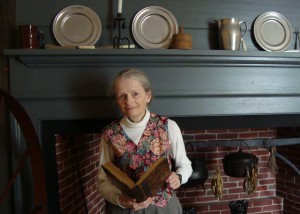 Marilynne K. Roach will lecture tonight at 6 p.m. at the New England Historic Genealogical Society (99-101 Newbury Street in Boston). Marilynne’s most recent book is Six Women of Salem: The Untold Story of the Accused and Their Accusers in the Salem Witch Trials, published by Da Capo Press.
Marilynne K. Roach will lecture tonight at 6 p.m. at the New England Historic Genealogical Society (99-101 Newbury Street in Boston). Marilynne’s most recent book is Six Women of Salem: The Untold Story of the Accused and Their Accusers in the Salem Witch Trials, published by Da Capo Press.
Scott C. Steward: You have written on a variety of subjects for a variety of audiences. What is it about Salem and the witchcraft trials that keeps you interested in the subject?
Marilynne K. Roach: What lured me to the Salem witch trials originally, as far as I can remember, was the potentially spooky aspect of it, the Halloween viewpoint that attracts tourists to the city today. But the occasional dip into reading about the subject really took hold after I visited Salem itself in the spring of 1976 and decided to look deeper into the events. Once I dove into the original material, the more real and less stereotyped the events became. Due to the rise of local history sparked by the Bicentennial at the same time, several historians (and genealogists) began to consider the trials seriously and produce books and articles that shed further light on the people and events. More discoveries continue to turn up – new old stuff – adding to the story. Once the people became real to me, I was hooked.
As alien to us as the concerns of the accusers and the wider community might be, what lessons about the permanence of human nature do you take from the Salem witch trials?
Humans periodically overreact to situations perceived as dangerous – real or mistaken. Mrs. Ann Putnam probably wanted to protect her children in 1692, but her misdirected efforts, combined with her distrust of certain neighbors, resulted in terrible consequences for the accused. The details and trappings of such outbreaks are different each time and the errors are not recognized until too late. Even when some actual problem exists, people can jump to conclusions based on insufficient evidence.
Can you imagine another book – perhaps a sequel – that treats another group of women going through the same experiences in Salem Village? What might that book look like?
A sequel about other Salem Village women would probably cover too much of the same territory as the first book. The experiences of various accused woman in Andover are less well-known and certainly dramatic. (I believe someone else is working on this angle.)
You are a lifelong resident of Watertown. Is there a Watertown subject that you would like to write about in due course?
Watertown was the seat of Massachusetts’ government for a year and a half at the beginning of the Revolution, a time when the town filled up with refugees, politicians, and spies, a circumstance largely overlooked by the usual concentration on the military aspects of the period, since Massachusetts did not convert to military rule but continued its representative civil government. The people and events converging on the place relate to the larger history of those times, their significance not confined solely to local interest any more than the importance of the Battle of Bunker Hill is limited to Charlestown alone.
Finally, is there anything else you would like NEHGS members to know about you and your book in advance of your talk tonight?
I’m preaching to the converted here, but using genealogy to find out who was related to whom is invaluable in sorting out the cast of historical characters.
For more information on Marilynne Roach’s lecture this evening, please visit: http://www.americanancestors.org/Event.aspx?id=29938.
Share this:
About Scott C. Steward
Scott C. Steward has been NEHGS’ Editor-in-Chief since 2013. He is the author, co-author, or editor of genealogies of the Ayer, Le Roy, Lowell, Saltonstall, Thorndike, and Winthrop families. His articles have appeared in The New England Historical and Genealogical Register, NEXUS, New England Ancestors, American Ancestors, and The Pennsylvania Genealogical Magazine, and he has written book reviews for the Register, The New York Genealogical and Biographical Record, and the National Genealogical Society Quarterly.View all posts by Scott C. Steward →
